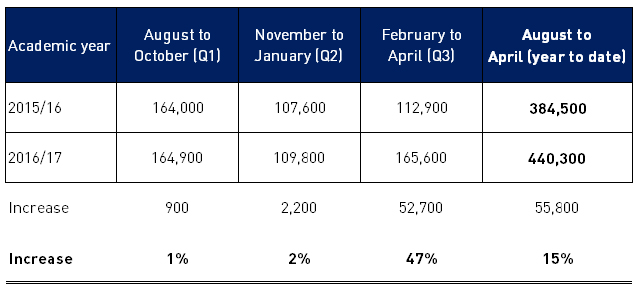The ESFA’s latest attempt at a non-levy apprenticeships tender now has over 100,000 words of ‘final’ clarifications. FE Week’s editor Nick Linford explores some of the reasons and pitfalls ahead of this Friday’s deadline
The level of interest in the £650 million non-levy tender should come as no surprise. Around 800 colleges and providers will lose access to funding for new starts from January if they don’t successfully win some funding, while 800 more companies that are on the register of apprenticeship training providers have been given their first opportunity to earn a contract. So the Education and Skills Funding Agency can expect around 1,600 serious applications from organisations already permitted to receive levy funding. Failure to acquire cash means that over 98 percent of employers, those not paying the apprenticeship levy, will be out of reach, so the stakes are very high.
The first attempt at this tender was delayed and then scrapped, with the ESFA blaming over-subscription despite all the obvious warnings.
Several hundred more companies have since been added to the register, so demand will be even greater the second time around. In an effort to avoid its previous problems, the ESFA has included several new and significant barriers, to either prevent, restrict, deter or arguably even trip applicants up.
Preventing any funding awards
The tender specification explains that any applicant awarded less than £200,000 will in fact receive nothing at all. Combine this rule with the tender value cap calculation (see below) and any eligible company with a turnover in 2015/16 of under £160,000 need not apply. There are likely to be several hundred companies on the register in this position. In fact, the register contains 48 companies that at the time of applying were a “new organisation without financial track record”.
Even if you were to successfully apply for, say, £300,000, the ESFA reserves the right reduce this to below £200,000 via “modelling”, in cases where it wants to prioritise a region or sector area, or simply if it faces general over-subscription. In this example, the successful tender would exceed the minimum, but would still result in being awarded no funding.
In the words of the tender specification (click here), “if the award modelling results in a contract value of less than £200,000 for the initial contract period, then the agency will not make an award to the potential provider”.
Restricting the size of the funding awarded
Assuming a provider get parts the first hurdle, it must apply for no more than the “tender cap”. In the first attempt at the tender, this was a straightforward £5 million. This time however, the cap needs to be calculated by the applicant, by applying one of four potential calculations depending on its “provider class”. A “new provider” that has never delivered apprenticeships is limited to £750,000 or less. A “subcontractor” that has never had its own contract is capped at £1.5 million. An “existing apprenticeship provider with non-levy historical delivery at or below £1.5 million for 2015/16” is also limited to £1.5 million. In all three cases, the final sum could be less, depending on 2015/16 turnover, multiplied by 1.25. Finally, the forth provider class comprises “existing apprenticeship providers with non-levy historical delivery above £1.5 million for 2015/16”; these are restricted to 110 per cent of their non-levy historical delivery, multiplied by 1.25.
As if working out what the most you can apply for isn’t complicated enough, last week the ESFA “clarified” what it meant by “non-levy historical delivery”; it now only includes funding in 2015/16 for starters. For existing apprenticeship providers, this excludes funding for apprentices who started before 2015/16, and will typically half – or more – what they had believed their tender cap to be.
Deterring providers from applying at all
For no obvious reason, the ESFA has more than doubled the amount of information it requires from applicants in the specification questionnaire, significantly increasing the cost. Across 17 questions, the applicant is expected to write more than 10,000 words regardless of the size of the contract it is applying for. I spoke to one consultant who as a result of this extra work has doubled his bid-writing fee to £7,000.
The ESFA also wants providers to complete its “volumes and values” spreadsheet, which does not actually calculate funding. You have to do that yourself, and only for starts from January 2018 and payments up to March 2019. The spreadsheet also contains up to 2,400 cells to complete, which is frankly ridiculous.
Taking into account this size, cost and complexity, alongside multiple changes to the tender documents, some companies that were initially interested in making a bid have been utterly deterred. The tender comes with nine attachments, two of which, the specification questionnaire and the volumes and values spreadsheet, have been revised four times each before of the deadline of midday this Friday.
Tripping applicants up
The ESFA has been at pains to stress that if you fail to understand the requirements, your application “may be rejected… and will not be evaluated”. In addition, the complex scoring matrix requires potential providers to “meet a threshold of 75 per cent of the total score (with no questions scoring below 50 per cent) in order to be eligible for an award. The necessary score is 1,275 out of the total of 1,700.”
What’s more, if any of the 17 questions score below 50 per cent, the ESFA “reserves the right not to complete the evaluation and to disqualify the potential provider”.
Now consider how complex the tender is, and the ensuing likelihood that a provider is tripped up by misunderstanding the requirements.
Yesterday the ESFA posted its final answers to clarification requests across three documents, which appeared after the deadline was delayed, which it blamed on the volume of clarifications it had to issue.
The “request for clarification document” (which is now on version five – click here) is a spreadsheet that contains an incredible 793 questions and answers, consisting of a staggering 97,566 words. Despite this, some answers are no more helpful than “See FAQ V2” – which forces providers to read an older version of the document! Many other answers are contradictory, for instance saying that you must and do not need to use the most recent version of the volumes and values spreadsheet. Others simply aren’t answers, stating “not confirmed”.
In addition to this clarification spreadsheet, there is a separate 13-page FAQ document in MS Word (click here), itself on its fourth version and updated as recently as yesterday. This runs to 4,019 words.
Combine the spreadsheet and the MS Word document and you have 101,585 words in the form of FAQs to read and cross-reference with other documents and versions. According to the all-knowing internet, the average reader will read 200 words per minute, which is 12,000 words per hour. So it would take eight and a half hours to read the current version of the FAQs alone, quite apart from the fact whether you are able to understand or interpret them correctly.
Will there be legal challenges once this mess of a tender is concluded? We only need one word to answer that: “yes”.





